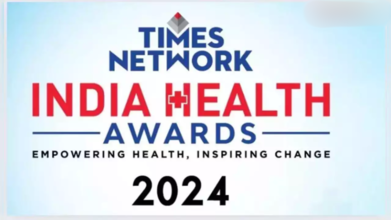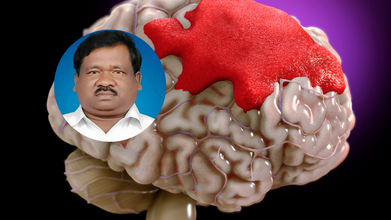- Health Conditions A-Z
- Health & Wellness
- Nutrition
- Fitness
- Health News
- Ayurveda
- Videos
- Medicine A-Z
- Parenting
- Web Stories
Times Network India Health Awards 2024 Honors Pioneers In Healthcare Innovation

The Times Network India Health Awards 2024, held on August 3rd in New Delhi, honored the outstanding contributions and innovations in the Indian healthcare industry. The prestigious event highlighted the significance of artificial intelligence (AI), value-based care, and the adoption of tech for improved accessibility & affordability in shaping the future of healthcare.
In his opening address, Times Network's President & COO- Digital Rohit Chadda, emphasized the transformative power of technology in healthcare and the critical requirement for a robust healthcare system, highlighting the urgent need for resilience and preparedness.
The awards ceremony celebrated the remarkable advancements and contributions made by healthcare organizations and professionals across the country with 50 awards given in various categories at the event.
The Health Awards also marked the launch of Healthandme.com, the new digital arm of Times Network. Owned and operated by BCCL, the website aims to provide reliable, engaging, and easy-to-understand one-stop content on everything health. The platform is developed in collaboration with doctors, healthcare professionals, nutritionists, fitness trainers, and mental health experts, ensuring that the information is both accurate and practical.
“Healthandme.com is designed to be your daily health companion and the go-to destination for every Indian seeking reliable and up to date healthcare information,” Rohit mentioned during the launch.
A memorable segment of the event featured actor and fitness icon, Milind Soman, who shared practical fitness tips to maintain a healthy lifestyle. The actor highlighted the importance of regular health checkups and to bring the focus to the 'gap' between two consecutive health check-ups to work on building a healthier body.
The evening also saw great minds and innovators from the healthcare community leading discussions on future of Indian healthcare, making healthcare sustainable with optimal use of tech and the adoption of tech for improved accessibility & affordability. They addressed the challenges of infrastructure gaps and the need for robust value-based care models.
Here's who won what- Categories with names
1. All India Best Multi-Speciality Hospitals Group, Apollo Hospitals Group, Mr. Madhu Sasidhar - President & CEO - Apollo Hospitals Group
2. All India Best Varicose Veins Hospital, AVIS Hospitals, Dr. Rajah V Kopala - Managing Director & Sr. Varicose Veins Specialist
3. All India Best Multi-Speciality Cancer Care, Apollo Cancer Centres, Ms. Mansi Rajpoot - AVP - Apollo Hospital
4. All India Best Single Specialty Cancer Hospital, HCG - Healthcare Global Enterprises Ltd, Dr. Sachin Trivedi - Director Medical Oncology; Dr. Trinanjan Basu - HOD Radiation oncology; Mr. Nikhil Kulkarni - Sr. Manager Corp Marketing
5. All India Best Liver Transplantation Hospital, Dr. Rela Institute & Medical Centre, Dr. Ilankumaran - CEO
6. All India Best in Paediatric & Child Care, Apollo Children's Hospitals Network, Dr. Karan Thakur - Vice President
7. All India Best Technologically Advanced Oncology Centre, Omega Hospitals, Ch. Haragovind - President - Omega Hospitals Group
8. All India Best Diabetes Care Chain, Dr. Mohan's Diabetes Specialities Centre, Mr. Saravanan Raman - Chief Marketing Officer
9. Leadership in Community Cancer Care (West), Mumbai OncoCare Centre, Dr. Mangesh Mekha & Dr. Abhishek Kakroo - Consultant Medical Oncologists
10. All India Best in Pain Management, Indo British Advanced Pain Clinic, Dr. Vijay Bhaskar - Founder & Director
11. Excellence in Cardiology, Dr. Vanita Arora, Sr. Consultant Cardiology - Apollo Hospitals (Delhi)
12. Excellence in Dental Implants (Hyderabad), Dr. Venkat Ratna Nag, Managing Director - The Dental Specialists
13. Best Liver Transplant Centre in Western India, Sahyadri Hospitals, Dr. Sunil Rao-Group COO; Dr. Manish Pathak, Transplant Anaesthetist
14. Lifetime Achievement Award, Dr. Arvind Lal, (Hony) Brig Dr. Arvind Lal, Padma Shri, Executive Chairman, Dr. Lal PathLabs Ltd
15. Excellence in Cardiology, Dr. Sai Satish, Sr. Interventional Cardiologist, Apollo Hospitals (Chennai)
16. Excellence in Gastroenterology, Dr. Mahesh Goenka - Apollo Hospitals (Kolkata), Director & Head of dept Gastroenterology/GI - Apollo Hospitals (Kolkata)
17. Rising Voice in Dermatology, Dr. Alekya Singapore, Founder & Chief Dermatologist - The Skin Sense
18. Excellence in Neurosurgery, Dr. Gaurav Tyagi, Sr. Consultant - Apollo Hospitals (Delhi)
19. Excellence in Interventional Cardiology (Hyderabad), Dr. J Shiv Kumar, Head of Cardiology Dept
20. Excellence in Otology & Middle Ear Implants (Hyderabad), Dr. Jaswinder Singh Saluja, Sr. Consultant ENT Dept
21. Bharat Health-Tech AI Innovation, Dozee, Gaurav Parchani, Co-Founder & CTO, Dozee
22. All India Excellence in Robotic Surgery in Gynecology, Dr. Rooma Sinha, Chief Gynecologist & Clinical Lead-Gynecology Robotic Surgery
23. Most Valuable Health Tech Company, Human Fractal, AI, Mr. Rajshekhar Pullabhatla
24. All India Best in Organ Transplants, MGM Healthcare, Chennai
25. Excellence in Internal Medicine & Music Therapy (Hyderabad), Dr. Jagannami Sreekanth, Sr. Consultant & Head of the Academics
26. Excellence in Neonatology (North Region), Dr. Avneet Kaur, Sr. Neonotologist & Director - Dept of Neonotology, Apollo Cradle (New Delhi)
27. Excellence in ENT (Hyderabad), Dr. E C Vinaya Kumar, Head of ENT Dept - Apollo Health City
28. Excellence in Hip Replacement Surgeries (Hyderabad), Dr. Balavardhan Reddy R, Sr. Consultant Orthopaedics
29. Excellence in First Aid & Preventive Pediatrics, Dr. Sivarajnini Santosh, Paediatrics & Social Activist, Magna Centres
30. Best Single Specialty Cancer Hospital (West), ACI - Cumballa Hill Hospital, Dr. Rahul Bajpai - Group CEO & Director
31. Excellence in Breast Surgery, Dr. Geetha Kadayaprath, Sr. Consultant Apollo Cancer Centre (Delhi)
32. Excellence in Neurology, Dr. C Rajesh Reddy, Apollo Health City (Hyderabad)
33. Excellence in Neurosurgery, Dr. Alok Ranjan, Apollo Health City (Hyderabad)
34. All India Best Emerging Neurology Hospital, MGM Healthcare, Chennai, Dr. Aakanksha Chandak - Head Doctor
35. All India Best Dental Clinic Chain, Dentzz Dental, Chairman Institute of Internal Medicine, Respiratory & Sleep Medicine
36. Excellence in Internal Medicine, Respiratory and Sleep Medicine, Dr. Randeep Guleria, Sr. Consultant - Apollo Hospitals (Delhi)
37. Excellence in Cardiothoracic & Vascular Surgery, Dr. Niranjan Hiremath, Sr. Consultant - Apollo Hospitals (Chennai)
38. Excellence in Neurosurgery, Dr. Srinivasan Paramasivam, Sr. Consultant - Apollo Hospitals (Chennai)
39. Excellence in Orthopaedic Manual Therapy Practitioner & Osteopath (Chennai), Dr. Balakumaran, Managing Director - Krishna Health Centre
40. Excellence in Cardiothoracic & Vascular Surgery, Dr. Sathyaki P Nambala, Head Cardiac Surgery unit - Apollo Hospitals (Bengaluru)
41. Excellence in Diabetic Foot Specialist & Podiatric Surgeon (Chennai), Dr. Prem Kumar, MD, Chennai Diabetes Foot Care
42. Excellence in Varicose Veins Treatment, Dr. Rajah V Kopala, Managing Director & Sr. Varicose Veins Specialist - AVIS Hospitals
43. Excellence in Fertility Care (Mumbai), Dr. Rohan Palshetkar, Head of Unit, DY Patil Fertility Centre, Bloom IVF
44. Most Promising Company in Pharma - SME, Radhe MedTech Pvt Ltd
45. Best Orthopaedic Hospital (Chennai), MGM Healthcare, Chennai
46. Pioneer in Healthcare AI, Elsevier, Mr. Shanker Kaul, MD, Elsevier - Health Solutions India
47. Excellence in Cardiac Electrophysiology & Pacing (Hyderabad), Dr. Soumen Devidutta, Sr. Consultant Cardiology
48. All India Expert in Robotic Joint Replacement Surgery, Dr. A V Gurava Reddy, Managing Director & Chief Joint Replacement Surgeon - KIMS Sunshine Hospitals
49. Excellence in Trichology (Mumbai), Dr. Suti Khare Shukla, Founder & Chief Dermatologist, SKS Elements of Aesthetics & Dr. Akshat Shukla
50. Best Fertility Pharma Company, Samarth Lifesciences, Samarth Lifesciences Team
51. Excellence in Fertility Care (Delhi), Dr. Suyesha Khanijao, OBGYN, Infertility Specialist
52. Excellence in Integrative Medicine (Hyderabad), Dr. Praveen K Saxena, Managing Director - Dr. Saxena Integrative Medicine
53. Best Health Tech Solution, Fedo.AI, Prasanth Madavana, Co-founder & CEO, FEDO
54. Excellence in Nephrology (Hyderabad), Dr. Aswini Kumar Panigrahi, Sr. Consultant Nephrology
Jharkhand Education Minister Ramdas Soren Suffers Brain Hemorrhage, Airlifted To Delhi

Credits: Canva
Jharkhand Education Minister Ramdas Soren remains in critical condition after suffering a severe brain injury following a fall in the bathroom at his residence early Saturday morning.
According to officials, the minister was initially admitted to a hospital in Jamshedpur, where doctors detected a blood clot in his brain. He was later airlifted to a private hospital in Delhi for more advanced treatment.
Health Minister Irfan Ansari confirmed the incident and said that Soren’s condition deteriorated rapidly after the fall. “Ramdas Soren’s health suddenly declined. He suffered a serious brain injury and internal bleeding in the brain. I have been in constant touch with his family and am monitoring the situation closely,” Ansari said.
Airlifted to Delhi for Advanced Care
After initial treatment in Jamshedpur, the decision was made to transfer the minister to Delhi for more specialized care. Former Union Minister and senior BJP leader Arjun Munda, who was present at Sonari Airport during the airlift, said, “I have spoken to the director of Delhi Apollo Hospital, and he has assured that treatment will begin as soon as the minister reaches. The doctors have diagnosed a brain hemorrhage due to a sudden increase in pressure. His condition is critical, but we are hopeful.”
On Saturday evening, the Delhi hospital issued a statement confirming that the minister was on life support and under the care of a multidisciplinary team of senior specialists. “A close watch is being kept on all vital parameters,” a spokesperson for the hospital said.
Understanding Brain Hemorrhage: What Happened to Ramdas Soren?
A brain hemorrhage, commonly known as a brain bleed, occurs when there is bleeding either inside the brain tissue or in the space between the brain and the skull. It is a medical emergency that can cause damage by increasing pressure on the brain, reducing oxygen supply, and killing brain cells.
Doctors categorize brain hemorrhages based on where the bleeding occurs:
Bleeding Outside Brain Tissue (Within Skull)
Epidural Hemorrhage: Occurs between the skull and the outer membrane (dura mater)
Subdural Hemorrhage: Bleeding between the dura mater and the arachnoid membrane
Subarachnoid Hemorrhage: Bleeding between the arachnoid and the innermost membrane (pia mater)
Bleeding Inside Brain Tissue
Intracerebral Hemorrhage: Bleeding within the brain’s tissues
Intraventricular Hemorrhage: Bleeding into the brain’s internal cavities that hold cerebrospinal fluid
In Soren’s case, doctors suspect a form of intracerebral or subdural hemorrhage, given the mention of clotting and pressure build-up.
Symptoms and Risks
Brain bleeds can come on suddenly and include symptoms like severe headache, nausea, vomiting, confusion, weakness or numbness (especially on one side of the body), vision problems, dizziness, seizures, slurred speech, and even coma. A particular warning sign is the so-called “thunderclap headache”, a sudden, intense pain that can signal a subarachnoid hemorrhage.
When not treated immediately, such bleeds can be fatal or lead to long-term neurological complications. In some cases, surgery is required to relieve pressure and remove clots.
What’s Next?
As of Saturday night, Ramdas Soren continues to remain on life support. No additional medical bulletins have been released since his transfer to Delhi, but officials have indicated that his condition is still being evaluated. “We are hoping for positive progress, but his condition remains critical,” said Arjun Munda.
Family members and close colleagues are at the hospital, and the Jharkhand government has said it will provide all necessary support for his treatment.
The political and public community has expressed concern and extended wishes for the minister’s speedy recovery. Further updates are awaited from the hospital and health authorities.
FDA Escalates Recall Of 64,800 Lbs. of Butter Over Undeclared Allergen

Credits: Canva
In a growing food safety alert, the U.S. Food and Drug Administration (FDA) has escalated a butter recall to a Class II risk level following concerns over undeclared allergens. The product in question, European Style Butter Blend manufactured by Bunge North America Inc., was found to contain milk that was not listed on the packaging label.
Class II Recall Indicates Moderate Health Risk
The risk reclassification, issued on Wednesday, July 30, places the product under the FDA’s second-highest warning level. According to the FDA, a Class II recall involves “a situation in which use of or exposure to a violative product may cause temporary or medically reversible adverse health consequences or where the probability of serious adverse health consequences is remote.”
While no illnesses or allergic reactions have been reported so far, the undeclared presence of milk poses a potential health hazard to people with dairy allergies or lactose intolerance.
Initial Voluntary Recall Announced in Mid-July
The recall began as a voluntary measure by Bunge on July 14, when the company announced it was pulling approximately 64,800 pounds, or 1,800 cases, of its one-pound butter blocks from shelves. The recalled butter was packed in white paperboard cases, each containing 36 one-pound blocks.
The affected products carry the lot code 5064036503 and were shipped to 12 distribution centers across the United States and one in the Dominican Republic.
Why the Undeclared Milk Is a Serious Concern
Milk is one of the nine major food allergens identified by the FDA, alongside eggs, fish, crustacean shellfish, tree nuts, peanuts, wheat, soybeans, and sesame. The FDA mandates clear labeling of such allergens because exposure, even in small amounts, can cause a range of reactions, from mild discomfort to life-threatening symptoms.
Food-related allergic reactions may include hives, facial swelling, vomiting, coughing, and skin irritation. More severe responses can result in anaphylaxis, a rapid-onset, whole-body allergic reaction that may lead to shock and, in extreme cases, death.
According to the Mayo Clinic, anaphylaxis occurs when the immune system floods the body with chemicals in response to an allergen. This can cause a sudden drop in blood pressure, narrowing of the airways, and potential organ failure if not treated immediately.
FDA Reiterates Importance of Allergen Labeling
In light of the recall, the FDA has emphasized the importance of allergen labeling and said it continues to enforce regulations requiring companies to clearly list all ingredients and potential allergens on packaging.
“More specific labeling requirements exist for foods that can cause allergies or other hypersensitivity reactions,” the agency stated. “These rules are designed to prevent accidental consumption of allergens and to protect consumers with dietary restrictions.”
The FDA also advised that anyone who experiences symptoms of an allergic reaction after consuming the recalled butter should “stop eating the food immediately, evaluate the need to use emergency medication (such as epinephrine), and seek medical attention.”
Company Yet to Comment
As of August 2, Bunge North America has not issued an updated public statement in response to the FDA’s reclassification and did not respond to a request for comment.
Food Safety Under Scrutiny Amid Other Recent Recalls
This butter recall follows a string of other high-profile food safety incidents this year. In recent weeks, more than 110,000 cases of popular chocolate ice cream bars were recalled across 23 states. Target-branded baby food was also pulled from shelves for containing “elevated levels of lead.”
Could This New Alzheimer’s Drug Buy Patients Four More Good Years? Here Is What We Know

Not forever, but what if you could press pause on Alzheimer’s just long enough to enjoy a few more good years? That is the tantalising promise behind a new drug called lecanemab, hailed as a game-changer in the fight against dementia.
The drug has already been licensed for use in the UK after trials showed it could slow the pace of decline in people with early-stage Alzheimer’s. But new long-term findings are turning cautious hope into something stronger: patients who stayed on lecanemab for four years experienced a noticeable delay in the disease's progression. Some even showed no decline at all.
How It Works
Alzheimer’s is known for its slow but relentless grip on memory and cognition, typically marked by the build-up of sticky proteins in the brain. Lecanemab targets tau, a protein that increases as the disease worsens.In the initial 18-month trial, the drug delayed Alzheimer’s progression by just under six months. That might not sound like much, but it’s the long game that matters here. Among 478 patients who remained on the drug for four years, the average delay before their disease advanced to the next stage stretched to almost 11 months.
Even more striking: 69 per cent of those with low levels of tau saw no decline at all over the four years. And over half in that same group actually improved their cognitive scores.
A Slow Slide Instead of a Steep Drop
Typically, people with mild Alzheimer’s see their scores on memory and function tests worsen by one or two points each year. But for those taking lecanemab, the total decline across four years was just 1.75 points. That’s a major shift in the rhythm of the disease, changing it from a downhill tumble to a slow shuffle.
Professor Christopher Van Dyck, who led the study at Yale School of Medicine, puts it simply: “You will get worse over time, but it will take longer to get there.” That extra time could mean more independence, more connection with loved ones, and more living.
Why Early Treatment is Key
The benefits weren’t evenly distributed. Patients who had less evidence of Alzheimer’s pathology, that is, fewer early changes in the brain, showed the most striking outcomes. In other words, the earlier you start treatment, the better your odds of preserving function.This makes a strong case for early diagnosis and intervention, which could shift the way we approach Alzheimer’s care. No longer is it just about managing symptoms; it’s about changing the trajectory of the disease.
Not a Cure, But a Clear Step Forward
Lecanemab isn’t a miracle cure. It doesn’t reverse Alzheimer’s, and it’s not suitable for all patients. But experts say it’s a major milestone. Reportedly, this is the first wave of disease-modifying treatments and there’s still plenty to understand.
Other Contenders in the Ring
Lecanemab isn’t the only drug showing promise. A similar treatment called donanemab was tested over a three-year period, though it was only administered for 18 months. Still, the results were encouraging: patients on the drug gained an extra six to 12 months before their disease progressed.
That might not sound earth-shattering, but in a condition where time is everything, even a few more months of clarity and connection can be priceless.
The research is still evolving, but the signs are encouraging. With continued trials, this could be the start of a new chapter in dementia treatment, one where patients and families have more time to prepare, more time to enjoy life, and more hope than ever before.
© 2024 Bennett, Coleman & Company Limited

